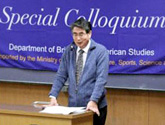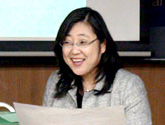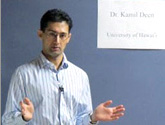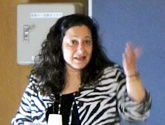- HOME
- Japanese Top
- Eibei GP
- English Top
- Lectures
- GP Lecture Series 2


| Date and Time | Feb 22nd, 2010(Mon), 13:30-17:30 |
|---|---|
| Place | Nanzan University, Nagoya Campus, MB1 |
| Hosting Professor | Masatake Arimoto (Professor, the Department of British and American Studies, Nanzan University) "Basics in Binding" |
| Dr. Kamil Deen (University of Hawai‘i at Manoa) "Binding in Thai: The Case for Nativism" |
|
| Keiko Murasugi (Professor, the Department of British and American Studies, Nanzan University) "Introduction to the Grammar Acquisition" |
|
| Dr. Bonnie Schwartz (University of Hawai‘i at Manoa ) "Let's Go on a Hawaiian Tour (of Child L2 Acquisition)" |
|
| Hosting Professor | Keiko Murasugi (Professor, the Department of British and American Studies, Nanzan University) |
| Lecturers | Masatake Arimoto (Professor, the Department of British and American Studies, Nanzan University) |
| Keiko Murasugi (Professor, the Department of British and American Studies, Nanzan University) | |
| Student Questioners | Hajime Miyagawa (3rd Year) |
How do people learn their mother tongue and other languages? How do children learn their first language with its grammar and rules without ever being taught them by their parents? How do we acquire a second language? This lecture introduced the latest research at the University of Hawaii at Manoa in first and second language acquisition.
 Masatake Arimoto(Professor, the Department of British and American Studies, Nanzan University). |
 Keiko Murasugi(Professor, the Department of British and American Studies, Nanzan University). |
 Dr. Kamil Deen. |
 Dr. Bonnie Schwartz. |
Dr. Murasugi & Dr. Schwartz's Lecture.
Dr. Schwartz's Lecture Summary by Hajime Miyagawa, Shiori Nagata, Ayaka Kojima, and Riho Naito
Dr. Schwartz dealt with issues in second language acquisition in her lecture. Her lecture was composed of three parts. First, she discussed how people whose first language is English acquire the condition of verb placement in German when they study German as a second language. Second, she focused on how native speakers of Korean acquire Island Conditions in English. Third, she discussed how native speakers of English acquire the feature of scrambling, which is particular to such languages as Japanese and Korea.
According to her research and a preceding study, L2 children and L1 children learn language in a different way; however, they have the same language skills eventually. Meanwhile, L2 children and L2 adults learn language in a similar way; nevertheless, they finally acquire the different language skills. L2 children are developmentally similar to both L1 youths and L2 adults, but they are completely different from mature L1 adults.
Prof. Arimoto & Dr. Kamil's Lecture.
Dr. Deen's Lecture Summary by Hajime Miyagawa, Shiori Nagata, Ayaka Kojima, and Riho Naito
All human beings are born with the same language knowledge (principles), such as Binding Condition C, and the variable part (parameters). Due to the variable part, languages differ. In the first few years, children find out how the variable part should be in their language by listening to adult's speaking.
Some sentences which violate Binding Condition C are ok, in terms of grammar, in Thai. However, children feel they are incorrect. This is because they have the knowledge of Binding Condition C and they notice that these sentences violate the condition. So we can assume that children whose mother tongue is Thai are born with Binding Condition C in their mind, the same language knowledge as speakers of other languages, and that later on they find out some sentences are grammatical, even though they violate the condition. This assumption is in line with the central idea of principles and parameters.
An introduction presentation by Hajime Miyagawa (Fourth Year).
GP, which stands for "Good Practice", are programs chosen for their benefits to tertiary level institutions in Japan by the Ministry of Education, Culture, Sports, Science and Technology. There are two primary goals to our department's GP program. Through a large variety of workshops, lectures, and exchanges with universities in America, we hope to increase our student's knowledge and understanding of other cultures while also developing their ability to communicate and express their ideas in English. Through the creating of a student committee which creates, plans, and runs events while also reporting on such events via their homepage, it is our hope that the students will also develop their creativity and organizational skills. These are all vital skills in the real world and our primary focus for this program.